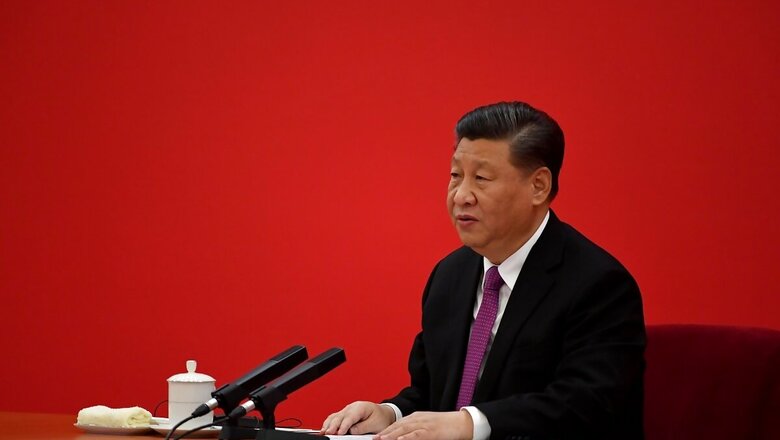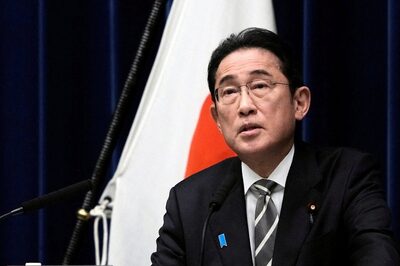
views
As China's ruling Communist Party is set to celebrate its centenary on July 1, experts warn that the potential of President Xi Jinping's continuation in power, unlike his predecessors, could potentially be "very destabilising" for it in the future in the absence of a successor.
Ironically, in its 100th year, the Communist Party of China (CPC), as it is officially called, relies on Xi just as it depended on its founder leader and principled ideologue 'Chairman' Mao Zedong, who held a vice-like grip on it until his death in 1976 after the party was established in 1921.
On the brink of collapse after his disastrous ideological experiments like the 1958 Great Leap Forward, mass mobilisation of labour to improve agricultural and industrial production but ended with a string of poor harvests resulting in famine, and the 1966 'Cultural Revolution', which resulted in the deaths of over 1.5 million people, the party was revived by moderate paramount leader Deng Xiaoping.
Deng, who won the bitter power struggle against the 'Gang of Four' headed by Mao's widow Jiang Qing and guided the party till 1997 had overturned Mao's hardline Marxism, replacing it with a pragmatic ideology of Socialism with Chinese Characteristics and undoing the harm caused by Mao that helped China to unleash the potential of the world's most populous country to emerge as the second-largest economy.
Deng's other political invention of collective leadership structure which kept the party intact accommodating all groups and sections of the 90 million-strong member CPC after his death in 1997 has gone back to one leader party with the emergence of Xi at the helm in 2012. China in 2018 approved the removal of the two-term limit on the presidency, effectively allowing Xi, 68, to remain in power for life.
While Xi's supporters projected his leadership as the need of the hour for China which is facing global adversity, analysts warn that his continuation in power after two terms unlike predecessors is potentially destabilising. It was normal practice that a successor to the General Secretary of the CPC is named during the second tenure of the party leadership.
With no clear successor in sight, observers expect Xi to remain as a paramount leader during the reshuffle of the party's governing bodies as the twice-a-decade Party Congress next year will shed light on how he plans to tackle succession and avoid a crisis within the party. It could prove to be his biggest challenge and will shape the party for decades to come, the Hong Kong-based South China Morning Post said in its report on Friday.
Xi has said that one way to evaluate a political system is to see whether the leadership succession is law-abiding and orderly. But unlike his predecessors, Xi did not endorse a successor at the end of his first term in 2017, and observers do not expect one to emerge in the new leadership line-up next year as well.
That could spell trouble for the party, according to Steve Tsang. When succession finally looms, it can potentially be very destabilising if the structure and/or process is not clear and well defined, Tsang told the Post.
His view was echoed by Nis Gruenberg, a senior analyst at the Mercator Institute for China Studies. limits and succession norms Xi has bought himself more time to establish his vision of the party-state and his national project for China, Gruenberg said.
But he has also inserted enormous uncertainty into the leadership system again, which in the end could destabilise the leadership system as soon as Xi as unchallengeable power centre has gone. Bringing in new blood will be crucial to avoid a succession crisis, something that would have a wider impact, given China's economic heft, according to a joint report by the Centre for Strategic International Studies in the US and the Lowy Institute in Australia.
The global impact of a 21st-century succession crisis would be immense, the think-tanks said in the April report. But even assuming Xi does retire in 2027 or 2032 in part or in full it stands to reason that he would continue to exercise enormous power, as did Deng Xiaoping after 1989, they said. Since Xi, a sedate and unassuming Vice President under the previous regime led by Hu Jintao has emerged as the most powerful leader, the party has reverted to one leader set up doing away with the collective leadership formula floated by Deng.
Xi has cast himself on the mould of Mao with a promise to restore the Chinese dream to lead the world and avert a collapse like that of the Soviet Communist Party in 1992. Assuming power as the leader of the CPC and head of the Central Military Commission, the overall high command of the Chinese military besides the Presidency, Xi, who carried out the biggest anti-corruption campaign purging over 1.5 million party officials, has firmly entrenched himself at the helm. The massive purge has also helped him to emerge as the core leader of the party, a status only enjoyed by Mao, putting himself ahead of the rest of the senior leaders, including number two Premier Li Keqiang.
He also strengthened the People's Liberation Army with massive modernisation and reforms setting a deadline for it to emerge as the world's best army by 2027 on par with the US military. Ahead of the centenary Xi, who is set to complete his second five-year tenure next year, has already made a strong case for his continuation to deal with the adverse situation faced by China and the CPC over COVID-19 origins, allegations of genocide against Muslim Uygurs in Xinjiang, the complete takeover of Hong Kong with a controversial National Security Law and his campaign to take over the self-administered island Taiwan and integrate it with the mainland. In a speech to the party in January this year, Xi said time and momentum are on China's side while the world faces unprecedented turbulent times.
The world is in a turbulent time that is unprecedented in the past century. But time and momentum are on our side. This is where we show our conviction and resilience, as well as our determination and confidence," he said, pointing out that China has contained coronavirus while the world continues to grapple with it. Western analysts likened his speech to that of French Emperor Napoleon's declaration that the conditions are right to make the most of a world that was in flux.
Steve Tsang, director of the SOAS China Institute at the University of London said Xi is now cautiously very optimistic. He sees the general environment and development as positive for China to assert a new historical role and sees challenges but feels confident that China under him will be able to make the most of it. It is a to paraphrase Napoleon declaration that the conditions are right for the previously slumbering lion to roar and he will see to it that it does, Tsang told the Post earlier.
.
Read all the Latest News, Breaking News and Coronavirus News here.




















Comments
0 comment